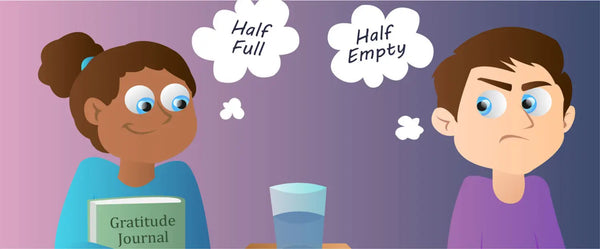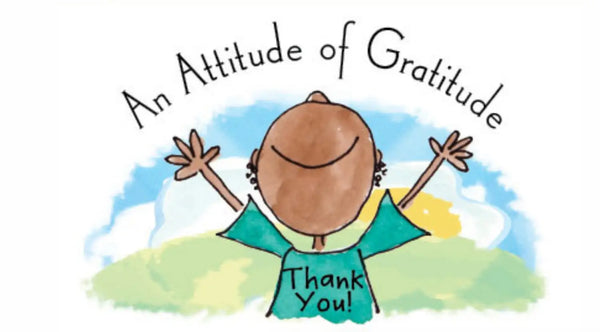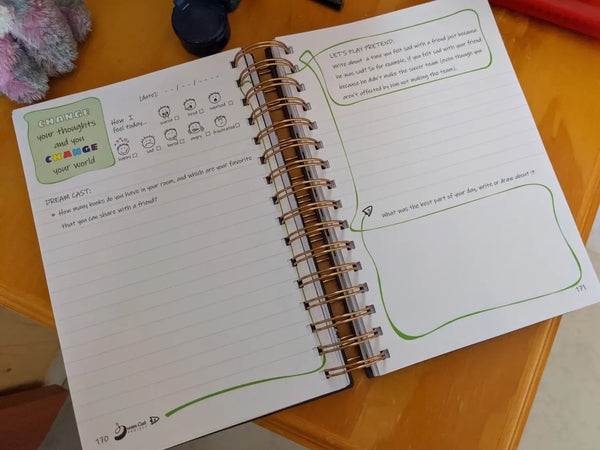We all want our kids to be happy and would move heaven and earth to make this a reality for our kids. We are often persuaded that the path to happiness is by giving our kids what they most desire in the form of physical things.
However a study published 2019 in the Journal of Happiness Studies found that gratitude is linked to happiness in children by age 5.
Another study published in the Journal of School Psychology, showed that grateful children (ages 11 to 13) tend to be happier, more optimistic, and socially stronger. They also report more satisfaction with their schools, families, communities, friends, and themselves. Grateful kids also tend to give more social support to others as well.
These studies clearly indicate there are a lot of good reasons to help kids experience and express gratitude. Instilling gratitude in your kids at a young age could help them grow up to be happier people - Parenting Success!
But how do we as parents practically teach our kids gratitude without just framing it in the social norms that are expected like. saying “thank you”.
Here are a few strategies that can help your kids feel more grateful.
It all starts with saying “Thank You”
Encourage your child to say “Thank you” on a regular basis. Offer gentle reminders like, “Your brother let you go first. What should you say to him?” or “What do you say to Grandma for giving you a cookie?”
It may feel like you are forcing your child to say thank you, however it is the first step in helping your child recognize that there is something to be thankful for, this is the most important.
This is where the understanding of gratefulness transcends the “Thank You”.
Thank you provides that basis to build on your child's understanding of gratitude to which there are 4 components.
- Noticing – Recognizing the things you have to be grateful for.
- Thinking – Thinking about why you’ve been given those things.
- Feeling – The emotions you experience as a result of the things you’ve been given.
- Doing – The way you express appreciation.
We can help our kids recognize these 4 components by asking them a few simple questions.
- NOTICE: What have you been given or what do you already have in your life for which you are grateful? Is there anyone thinking about you or that cares about you enough to give you the gift? ? Are you grateful for any people in your life?
- THINK: Why do you think you may have received gift? Do you think you owe the giver something in return? Do you think you earned the gift because of something you did yourself? Do you think the person gave you a gift because they thought they had to or because they wanted to?
- FEEL: When you receive a gift or someone is king to you, does it make you feel happy? What does that feel like inside? What about the gift makes you feel happy? These questions help the child connect their positive feeling to the gifts that they receive in their lives.
- DO: How would you show how you feel about receiving a gift or someone being nice to you? Does the feeling you have about this gift make you want to share that feeling by giving something to someone else?
We designed the Dream Cast Kid Journal to help reinforce this concept through daily prompt questions that covers 10 core topics like gratefulness, empathy and kindness, growth mindset, confidence and mindfulness to name but a few. LEARN MORE HERE
Whenever your child receives a physical gift or someone shows kindness to them, strike up a conversation that helps them experience more gratitude. You also might start conversations that show how you both think, feel, and respond to the people and gifts you’re grateful for in your life.
We can do more than we think as parent by Modelling Gratitude daily
A 2016 study published in Applied Developmental Science found that grateful parents tend to raise grateful children.
There’s a good chance this is because kids learn to be grateful by hearing and seeing their parents experience gratitude.
Here are several ways you can model gratitude for your children:
- Say “Thank you.” Whether you thank the clerk at the store or you thank your child for clearing the table, make sure you’re thanking people often.
- Talk about gratitude. Make it a point to share what you’re grateful for. Even when you have a rough day or something bad happens, point out that there’s still a lot to feel grateful for. Instead of complaining about the rain, talk about being grateful that the plants are being watered so you’ll have food to eat.
- Express gratitude. When your child sees you writing “thank you” notes or sending a token of appreciation to someone, you’ll teach them to do the same.
The Benefits of Being Grateful
One reason that gratitude has such a powerful effect on our lives lies in a hormone called oxytocin. Nicknamed the “cuddle drug” or the “bonding hormone,” oxytocin is a brain chemical that promotes trust, attachment, empathy, intimacy, relaxation, generosity, calmness, and security, while reducing anxiety and stress. Oxytocin enhances everything from cardiovascular regulation to wound-healing and can possibly prevent schizophrenia and other psychiatric disorders. Here are a few reasons why teaching your child to be grateful will have a positive impact on their future.
- Expressing gratitude can increase oxytocin in the brain which promotes empathy, relaxation, generosity, calmness, trust, attachment, intimacy, and a sense of safety. It also reduces the stress hormone which in turn, reduces anxiety.
- Thinking about what we are thankful for can redirect our attention from toxic emotions such as resentment, regret, and bitterness.
- Grateful kids often grow up to be emotionally, physically and socially successful.
- Kids who can look at their lives and be thankful for what they have often have decreased levels of depression, envy, and materialism.
- Thankful kids can recognize the goodness in their life which helps them feel more connected and loved.
- Appreciation leads to generosity. Studies show that the more grateful a person, the more likely he or she is to give to others.
- Acknowledging gratitude fosters strong relationships.
- It can train the brain to be more sensitive to other people over time which then leads to… an improved life and overall mental health!
---------------------------------------------------
Article source:
- A 2019 study published in the Journal of Happiness Studies1 found that gratitude is linked to happiness in children by age 5. https://link.springer.com/article/10.1007/s10902-019-00188-6
- Froh JJ, Sefick WJ, Emmons RA. Counting blessings in early adolescents: An experimental study of gratitude and subjective well-being. Journal of School Psychology.












